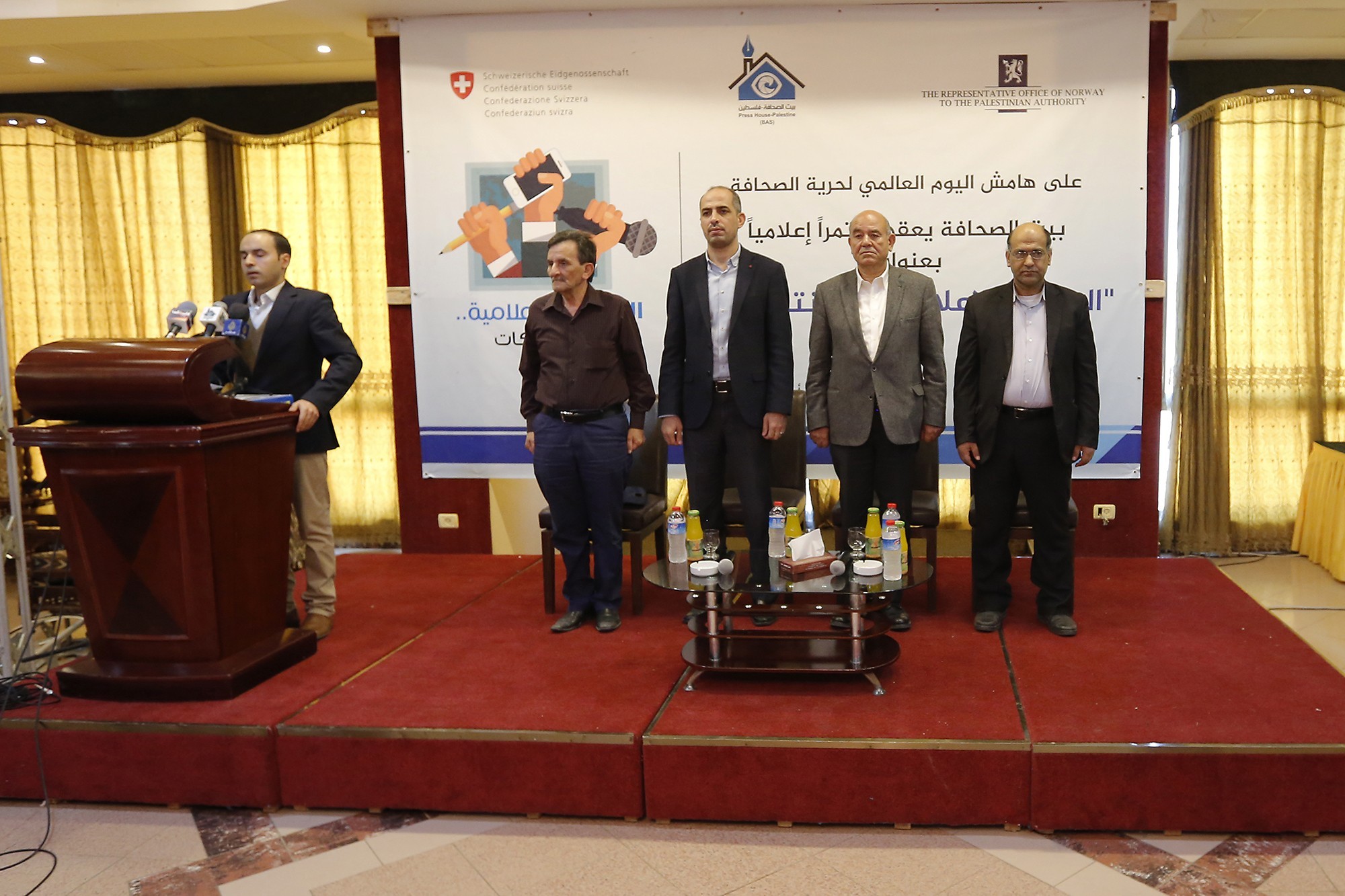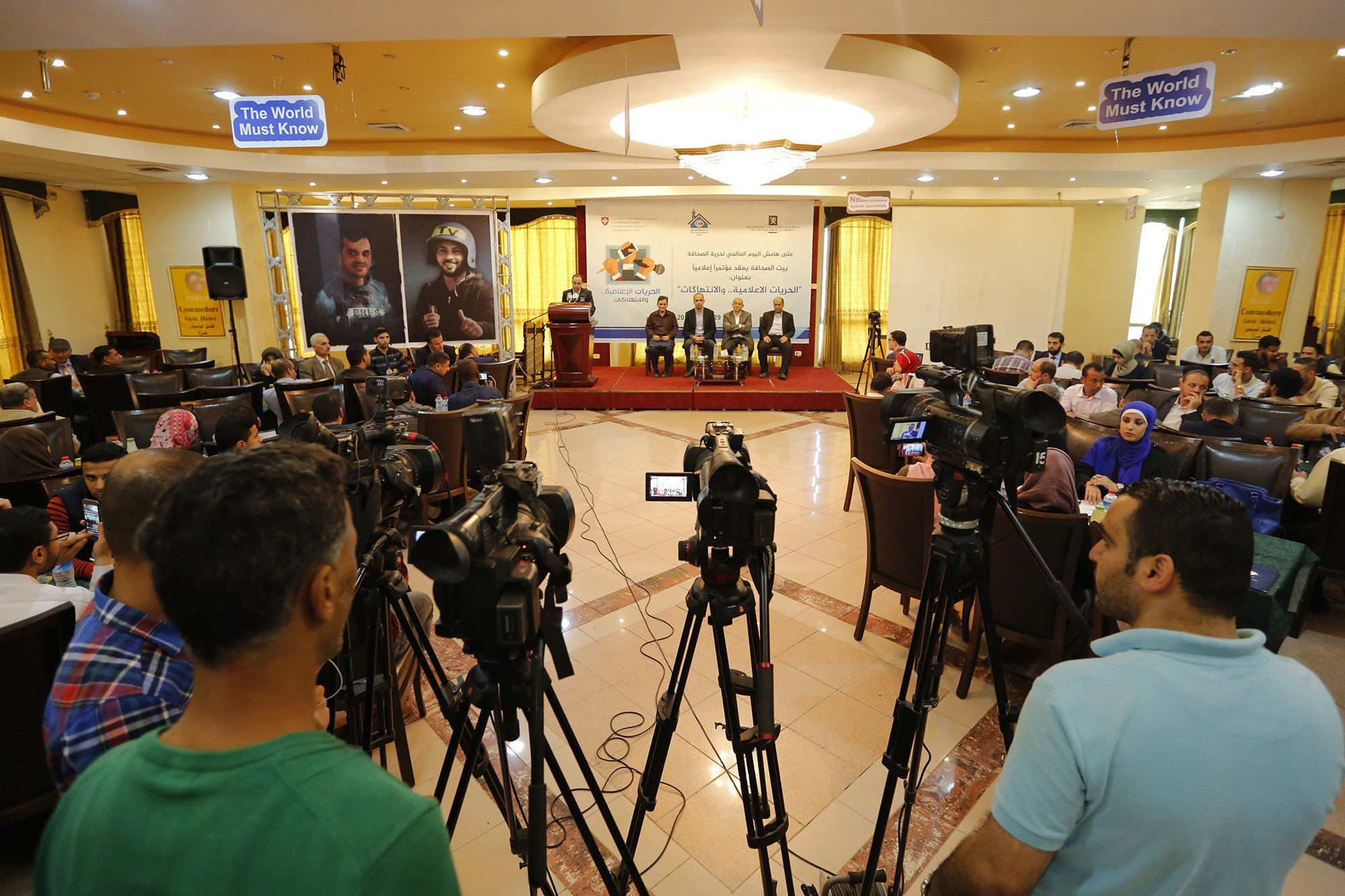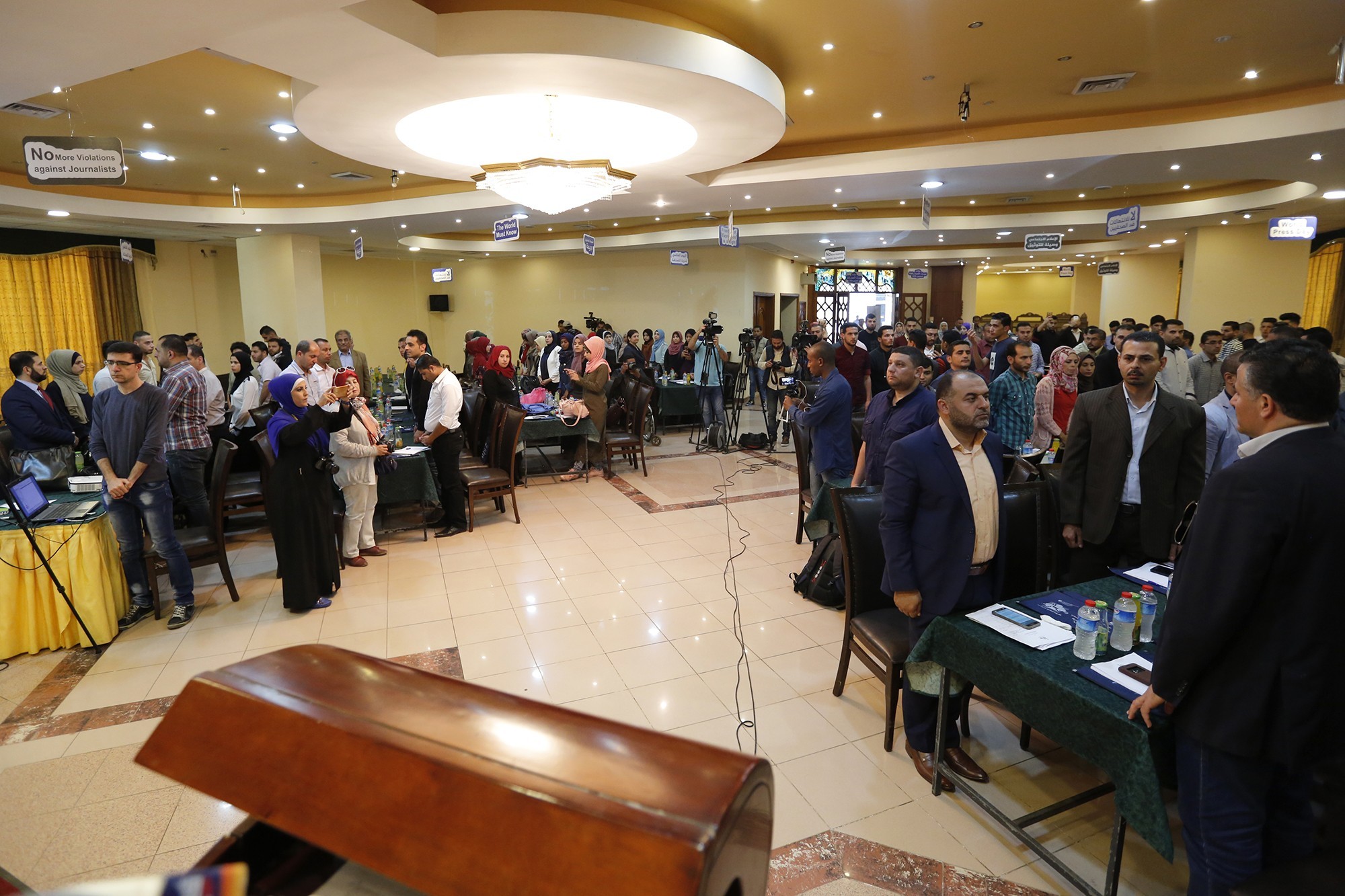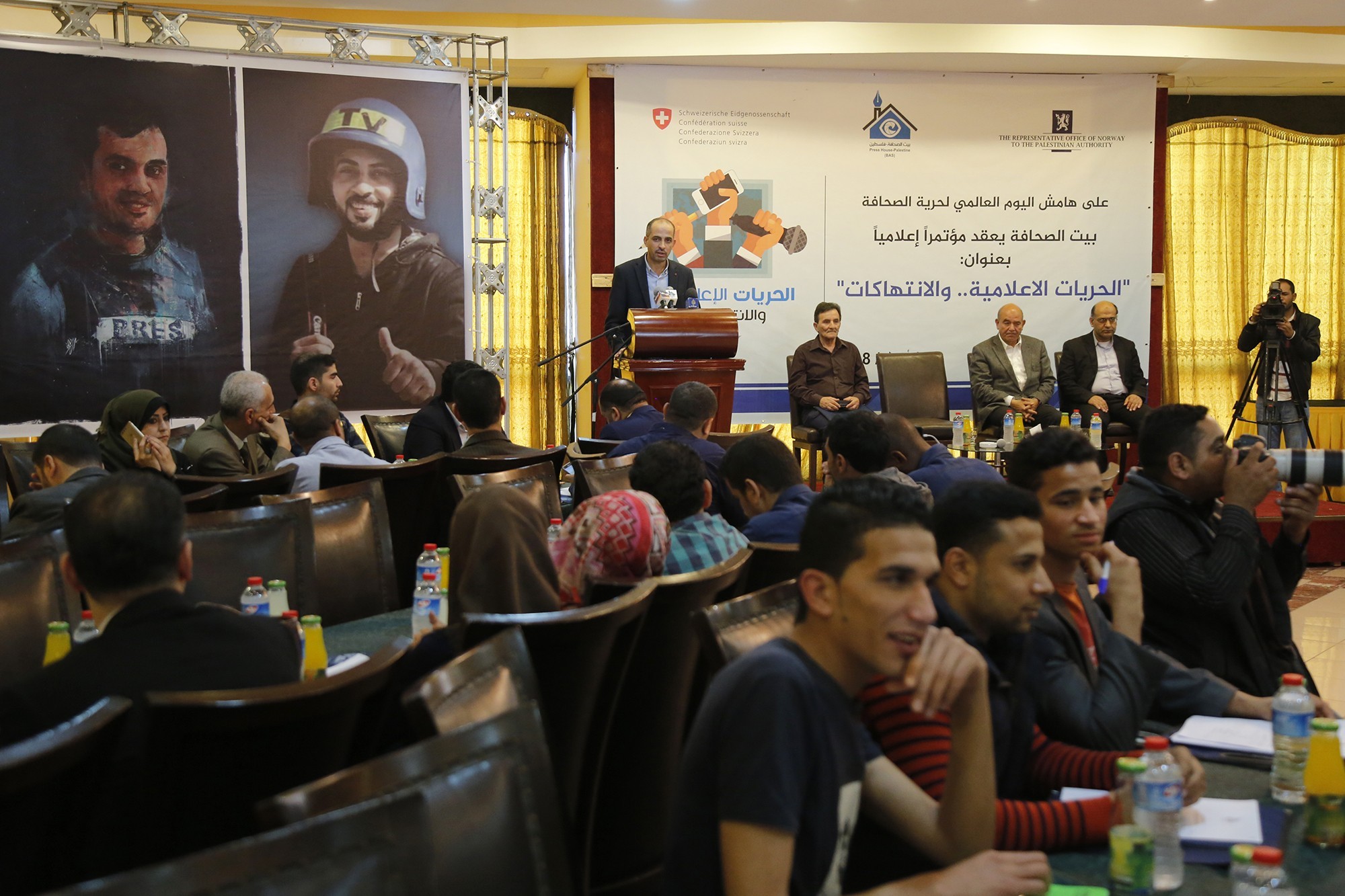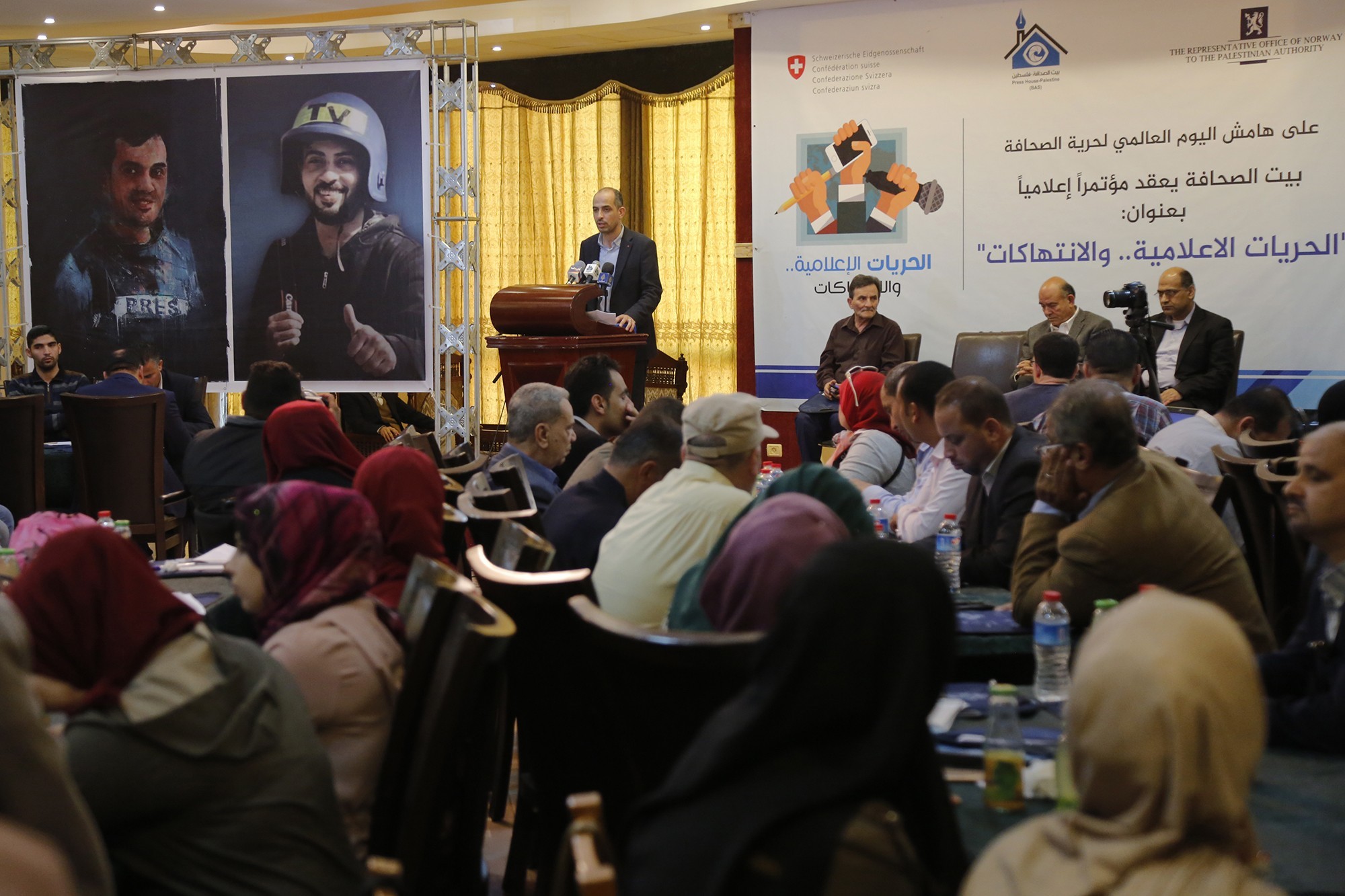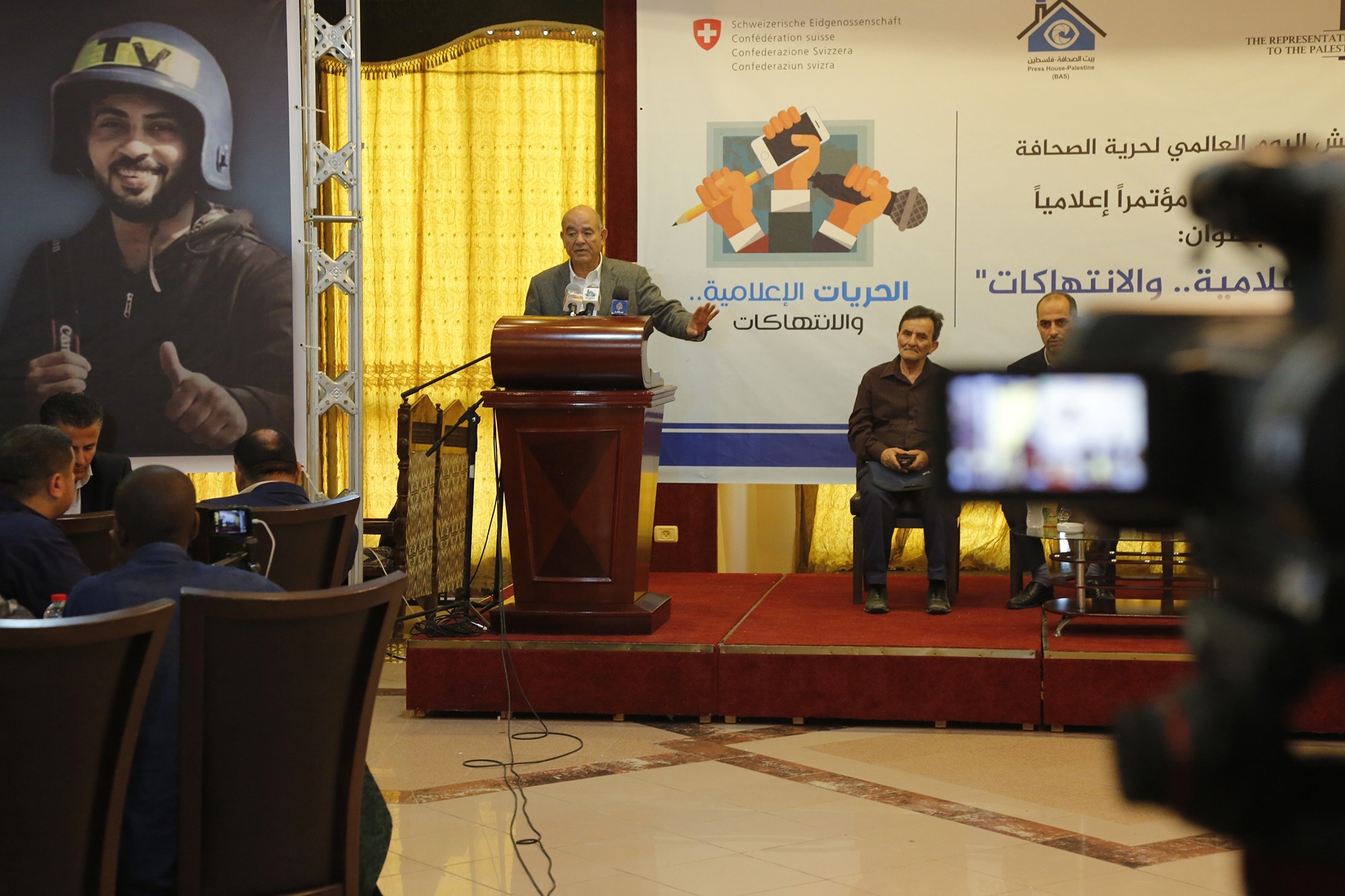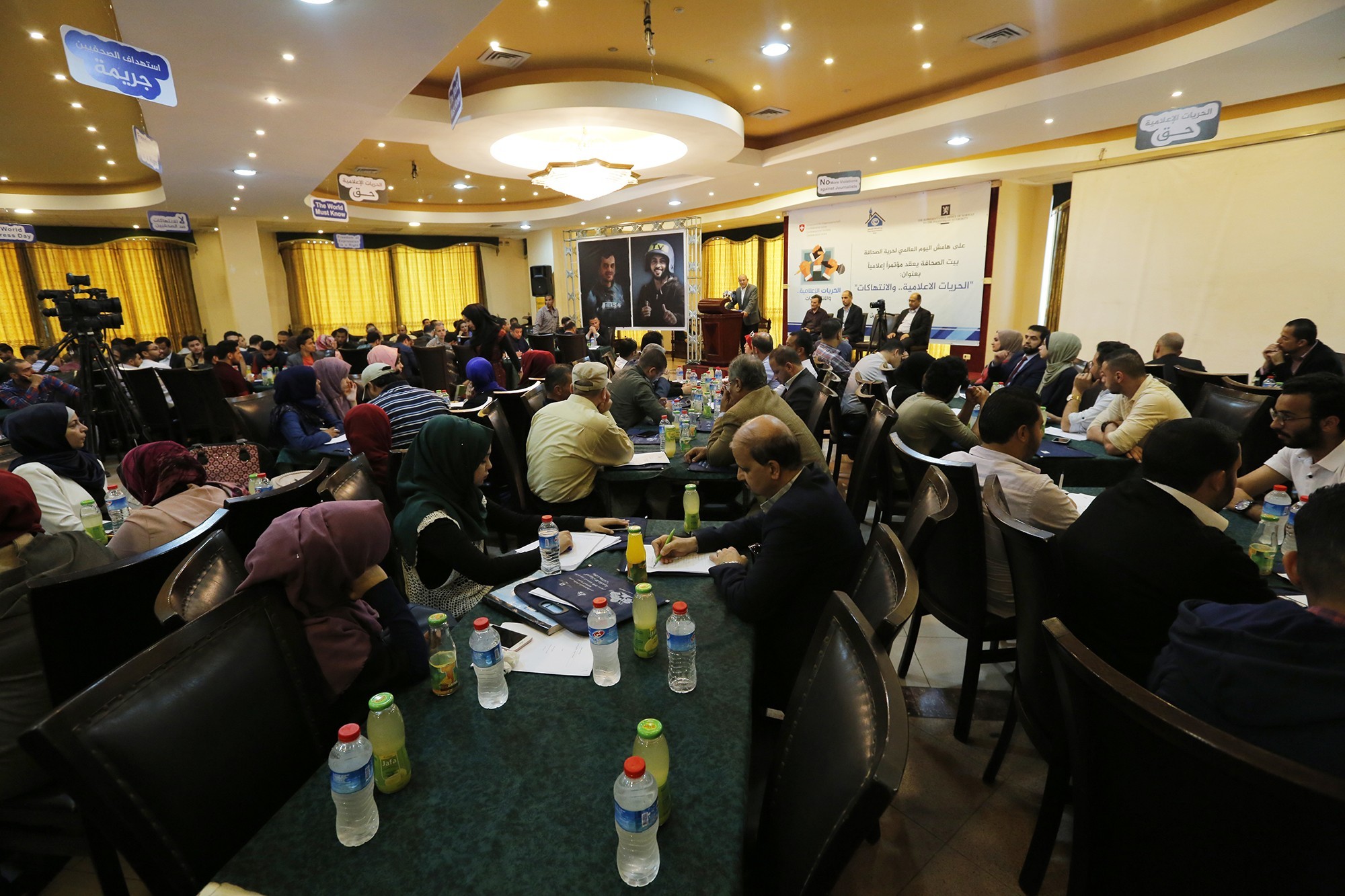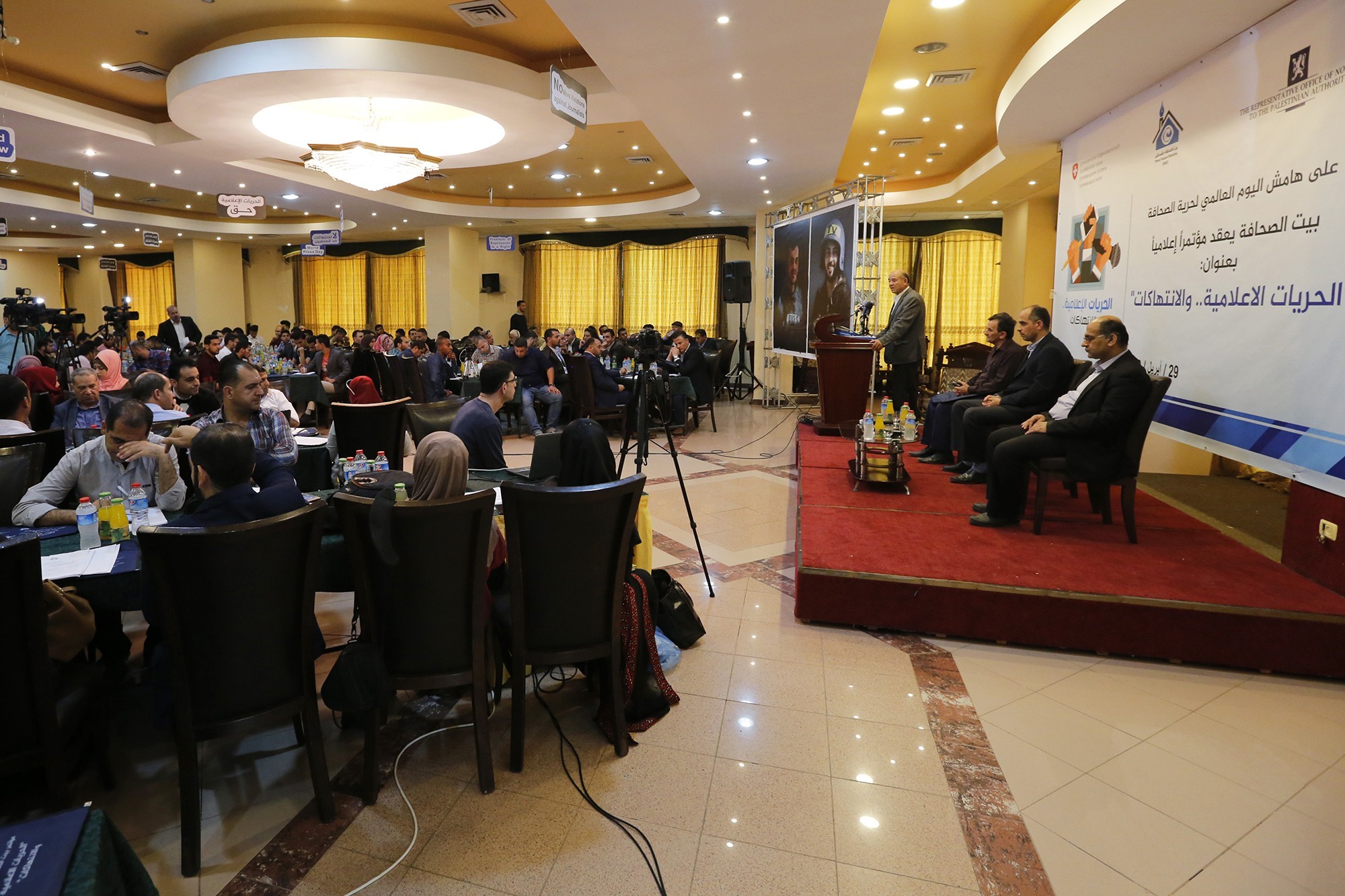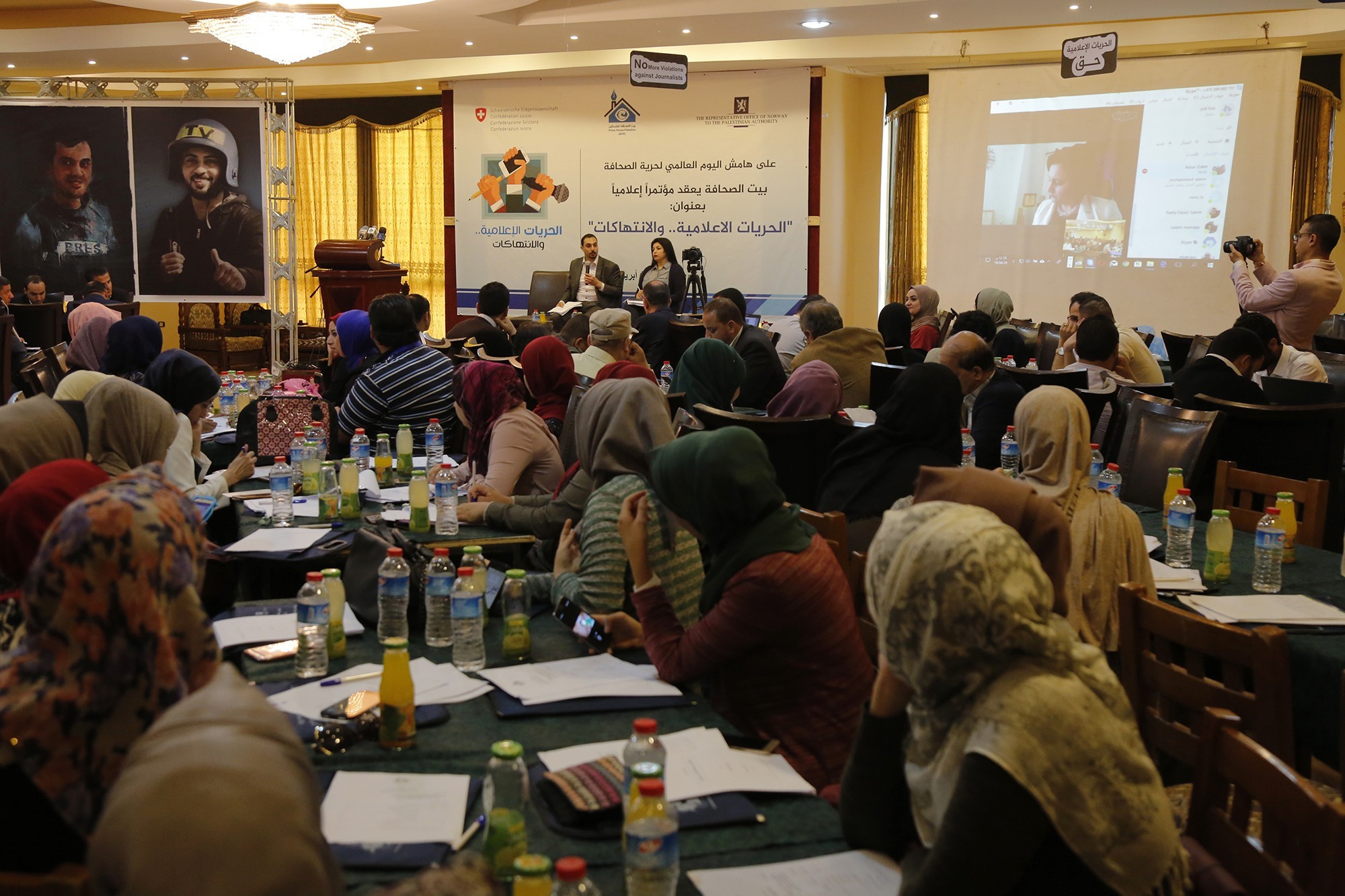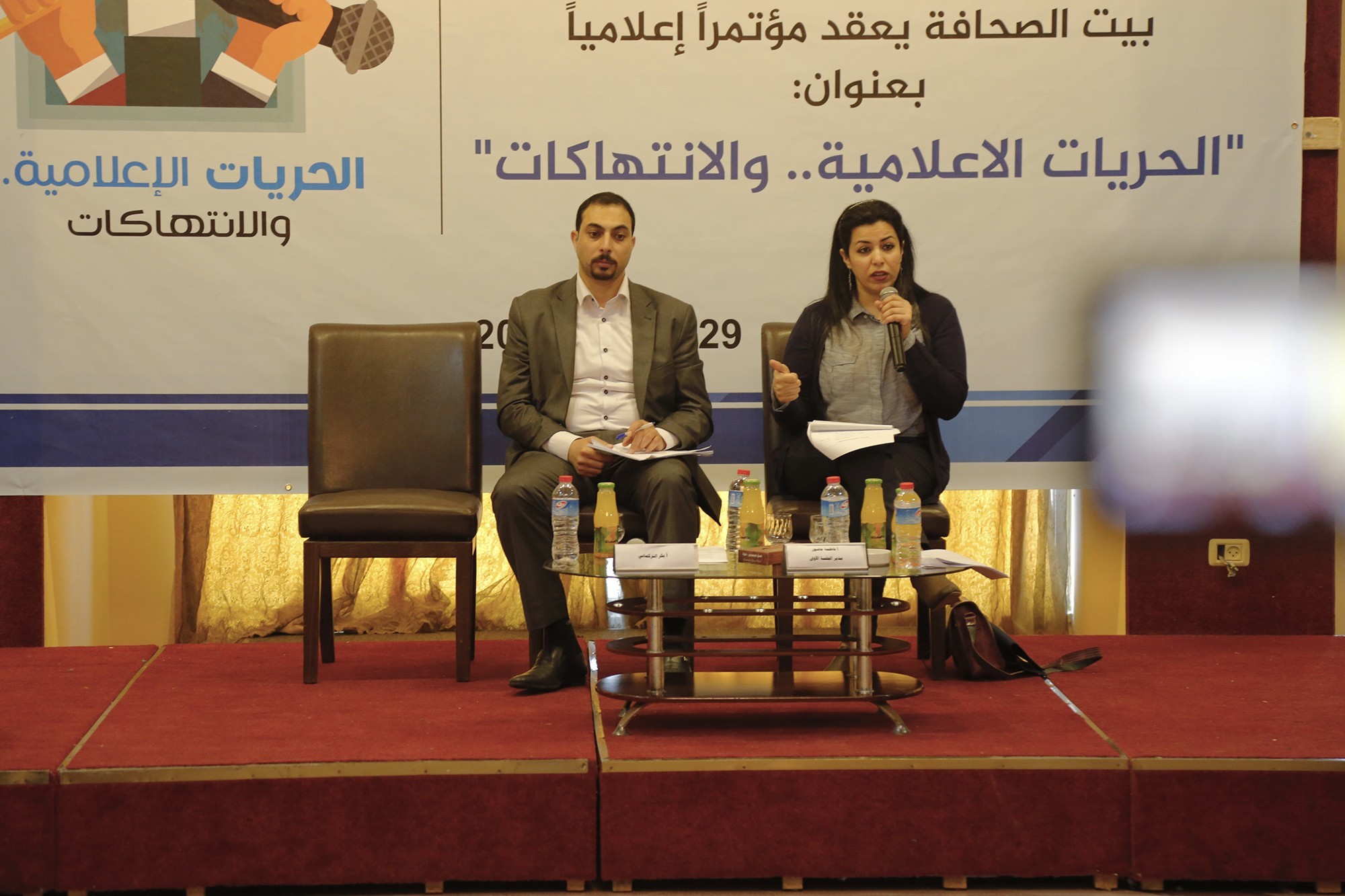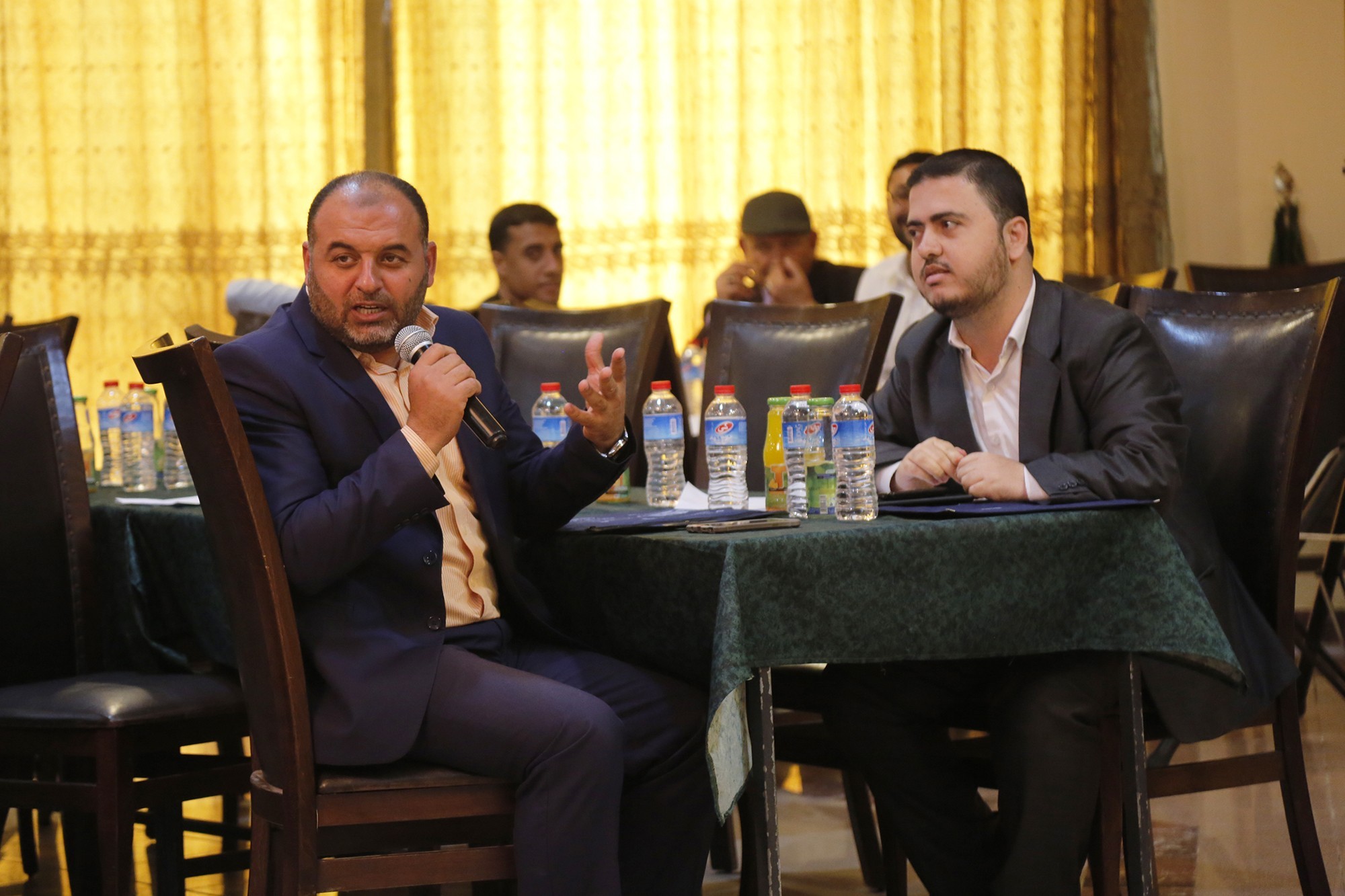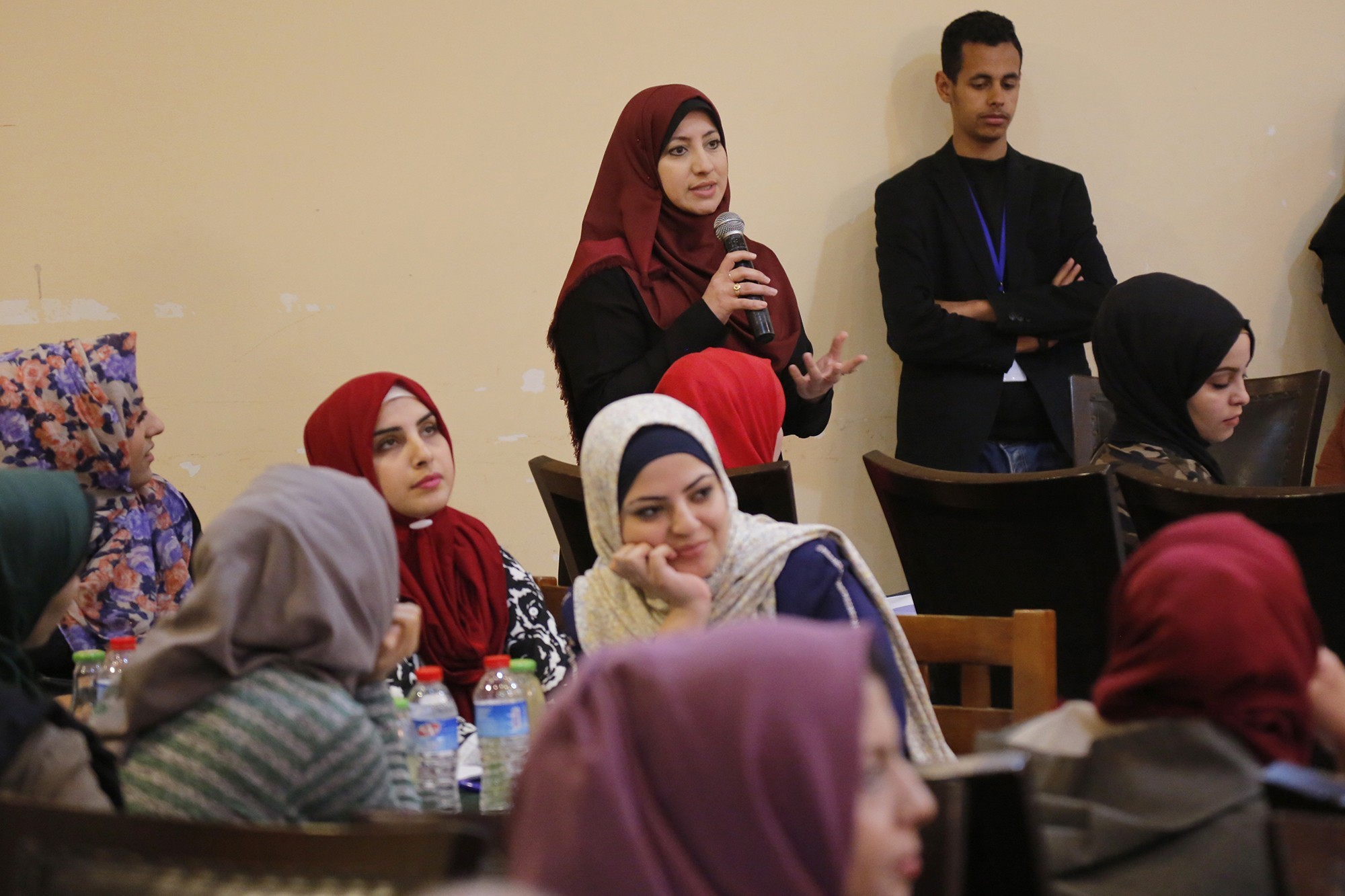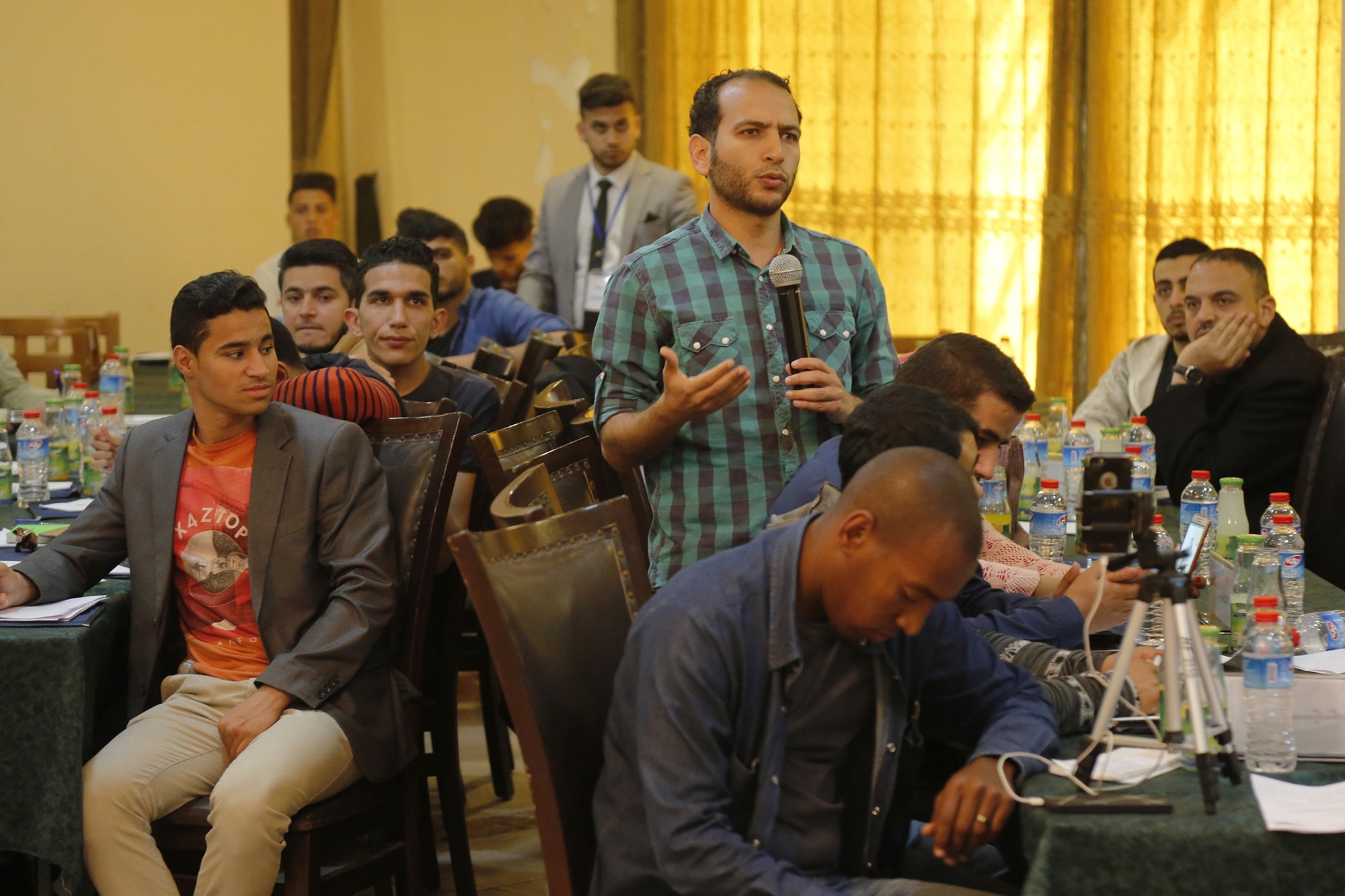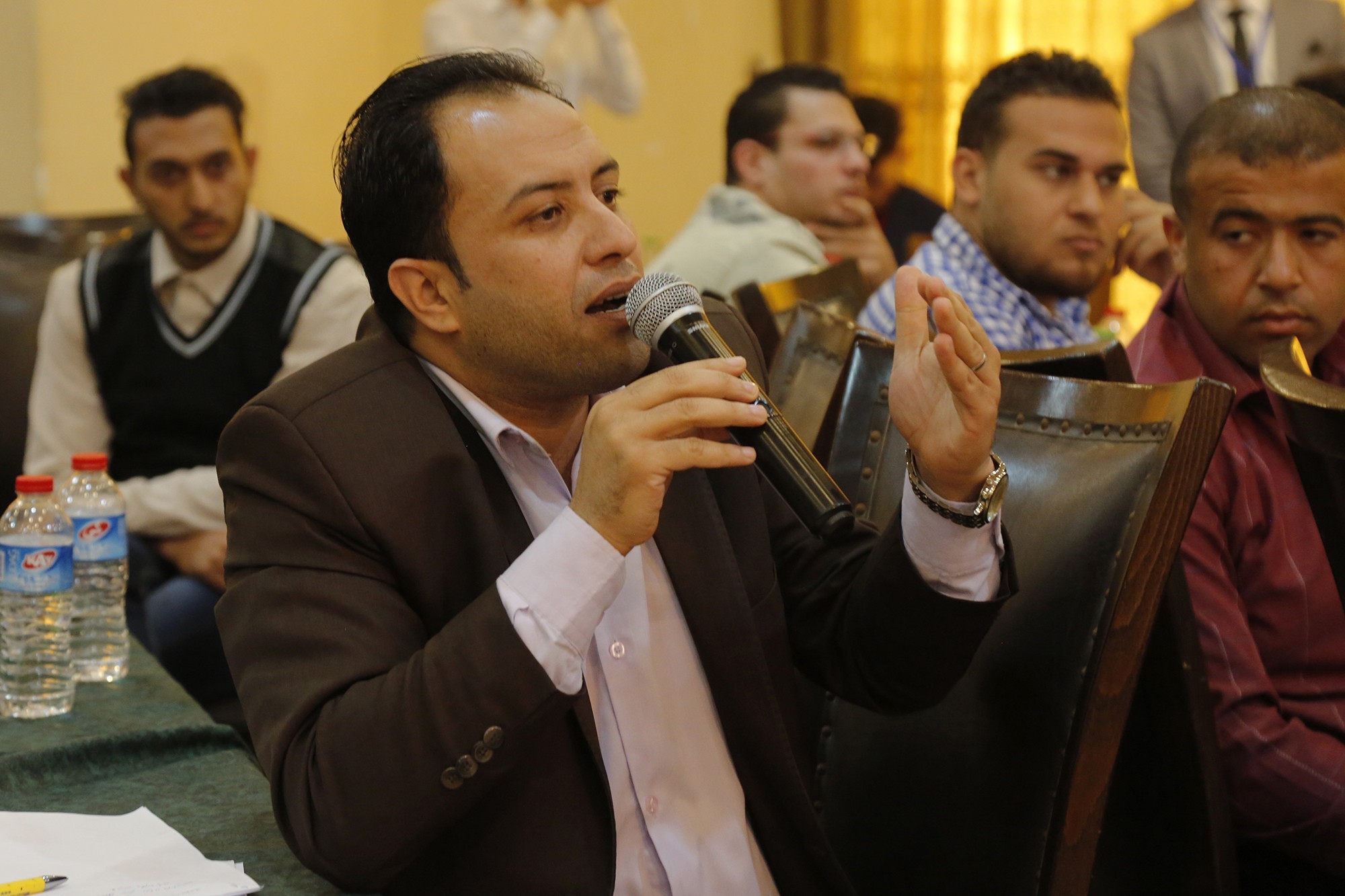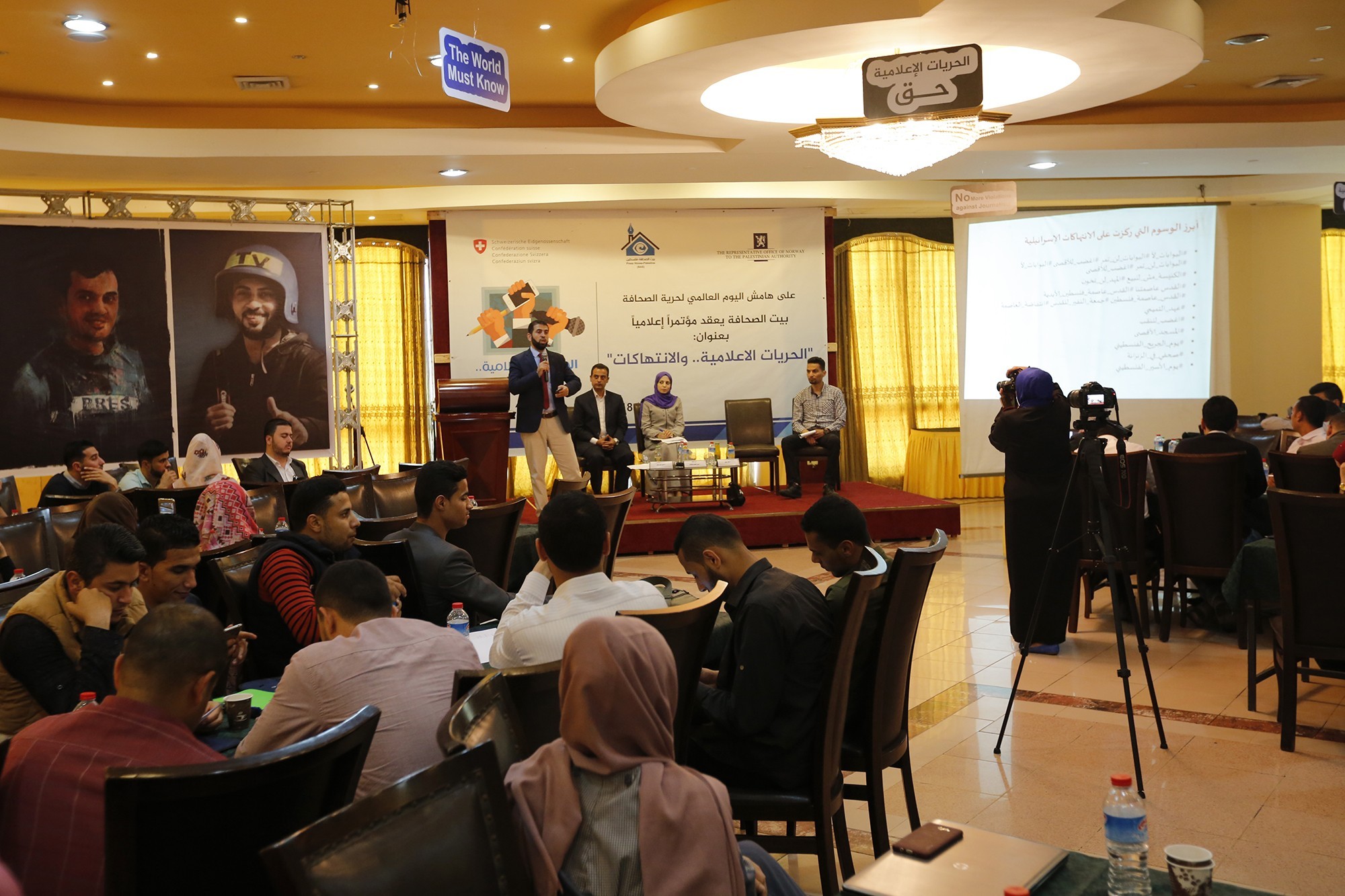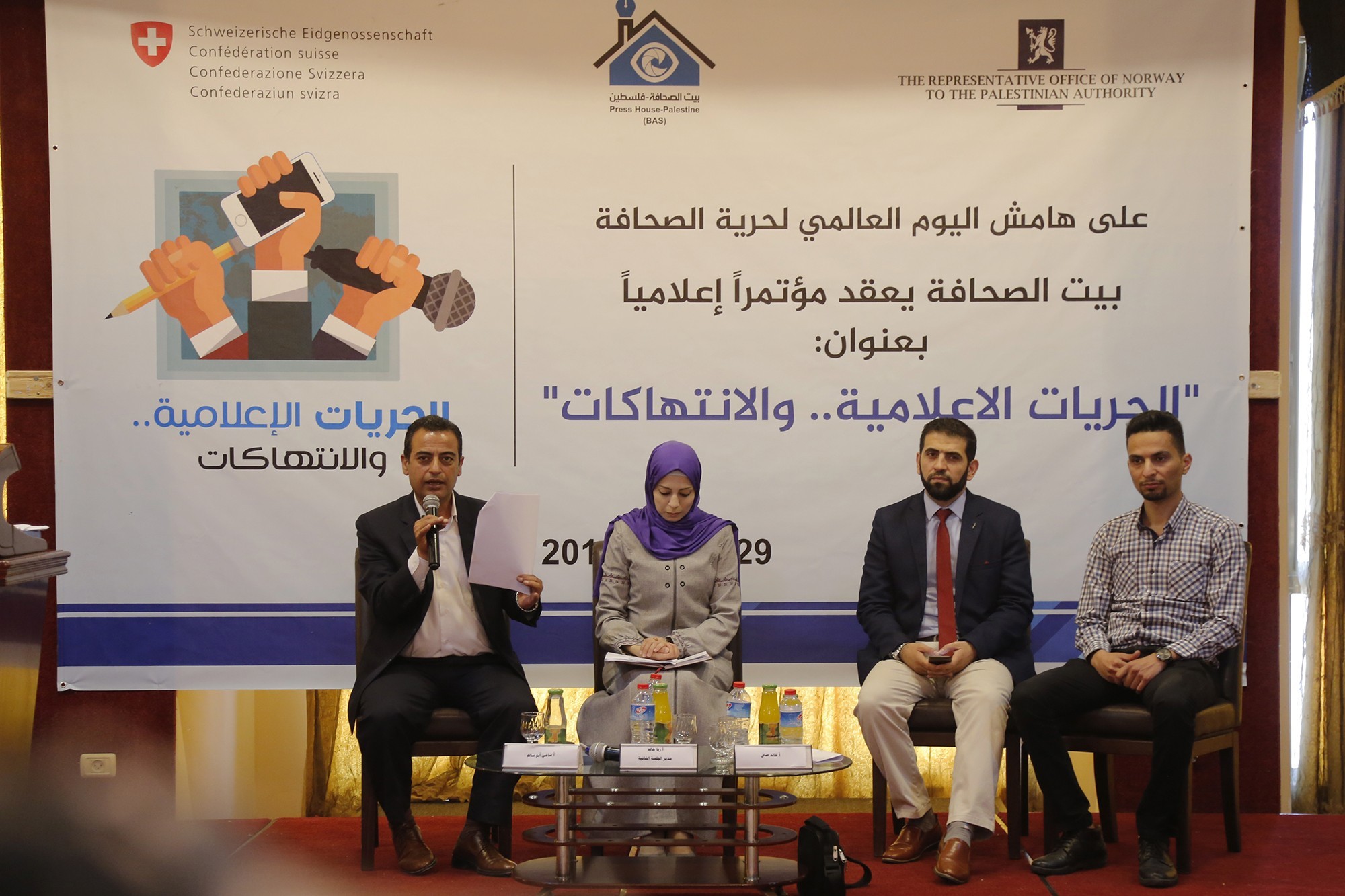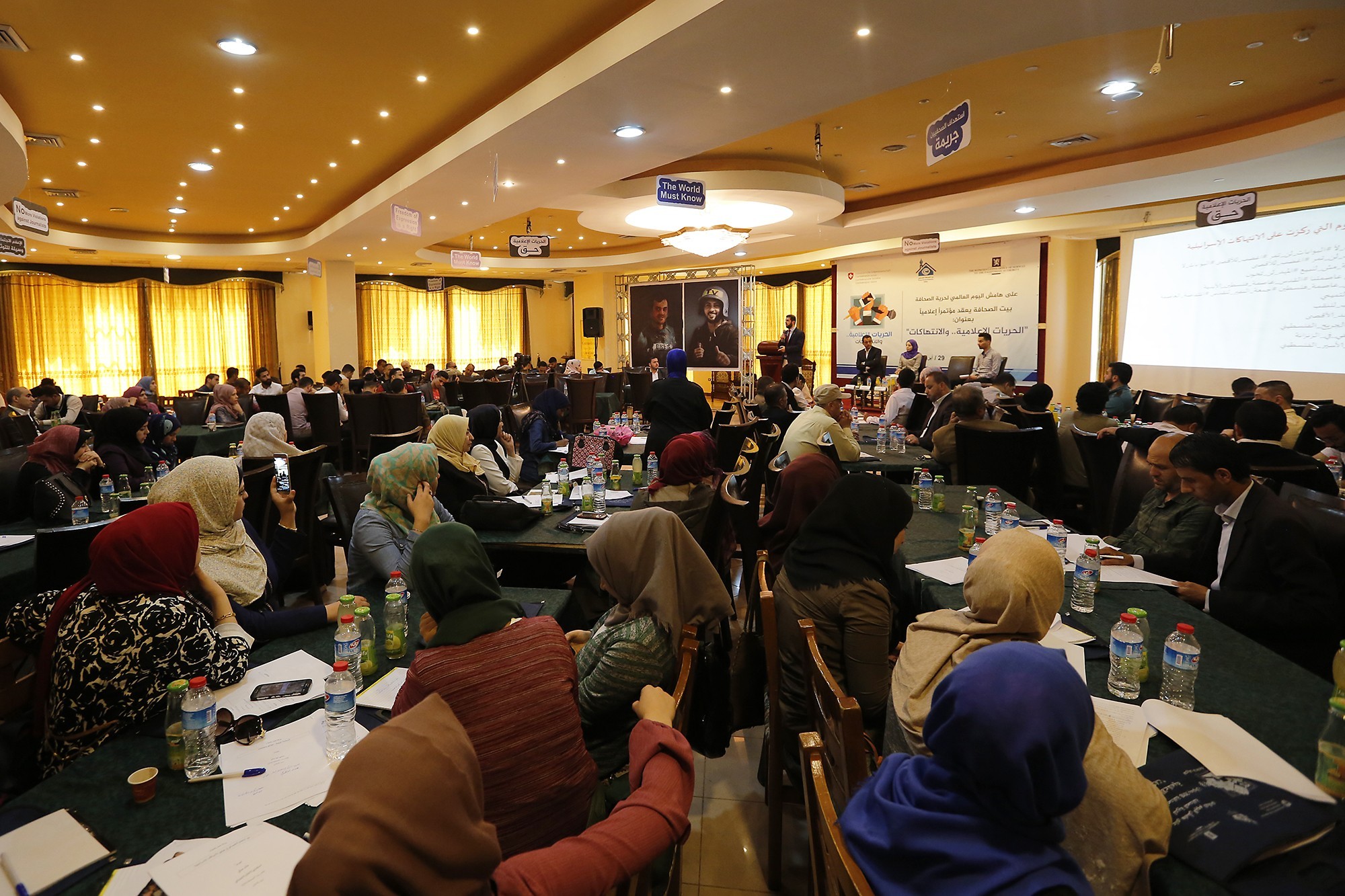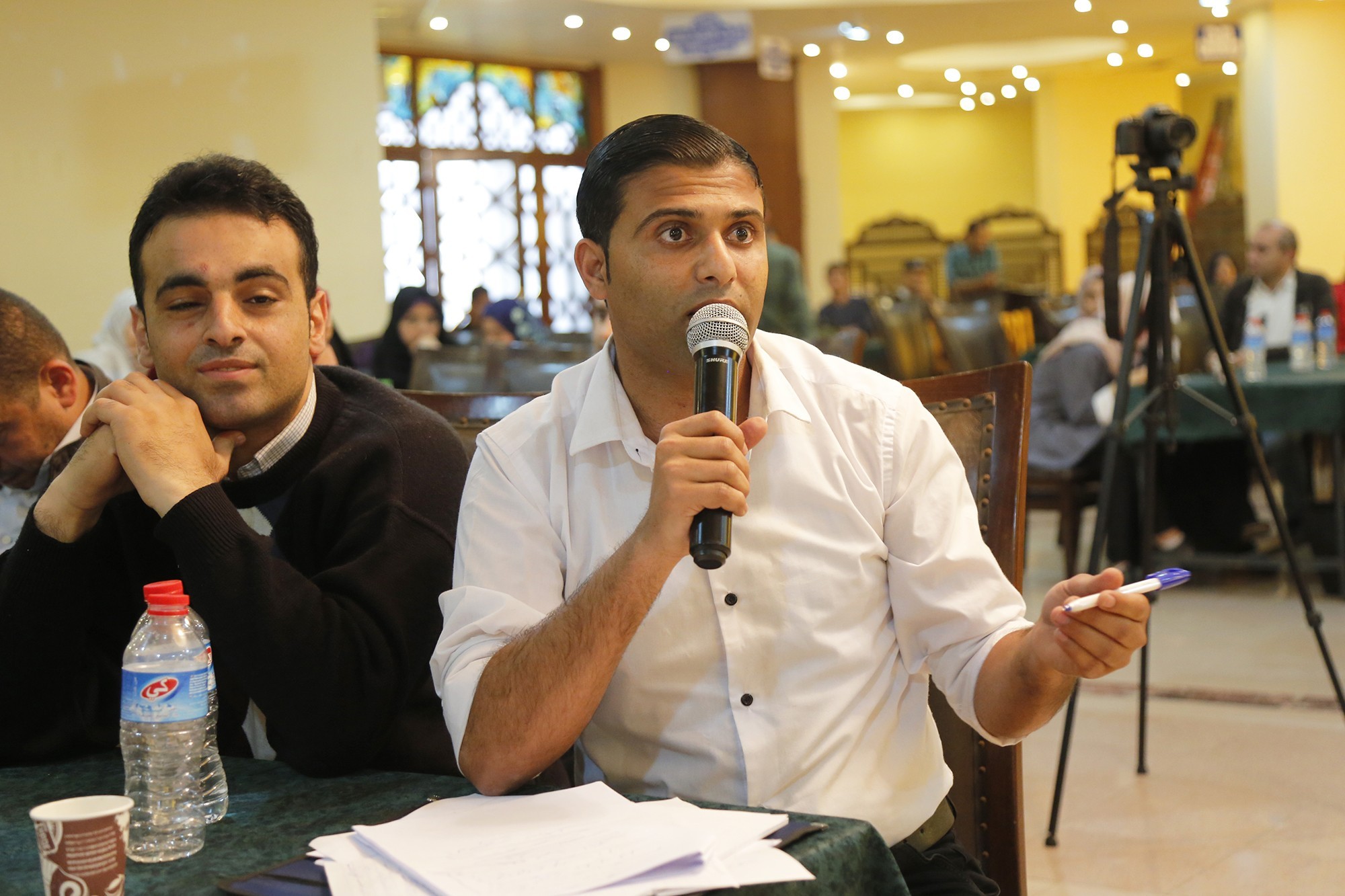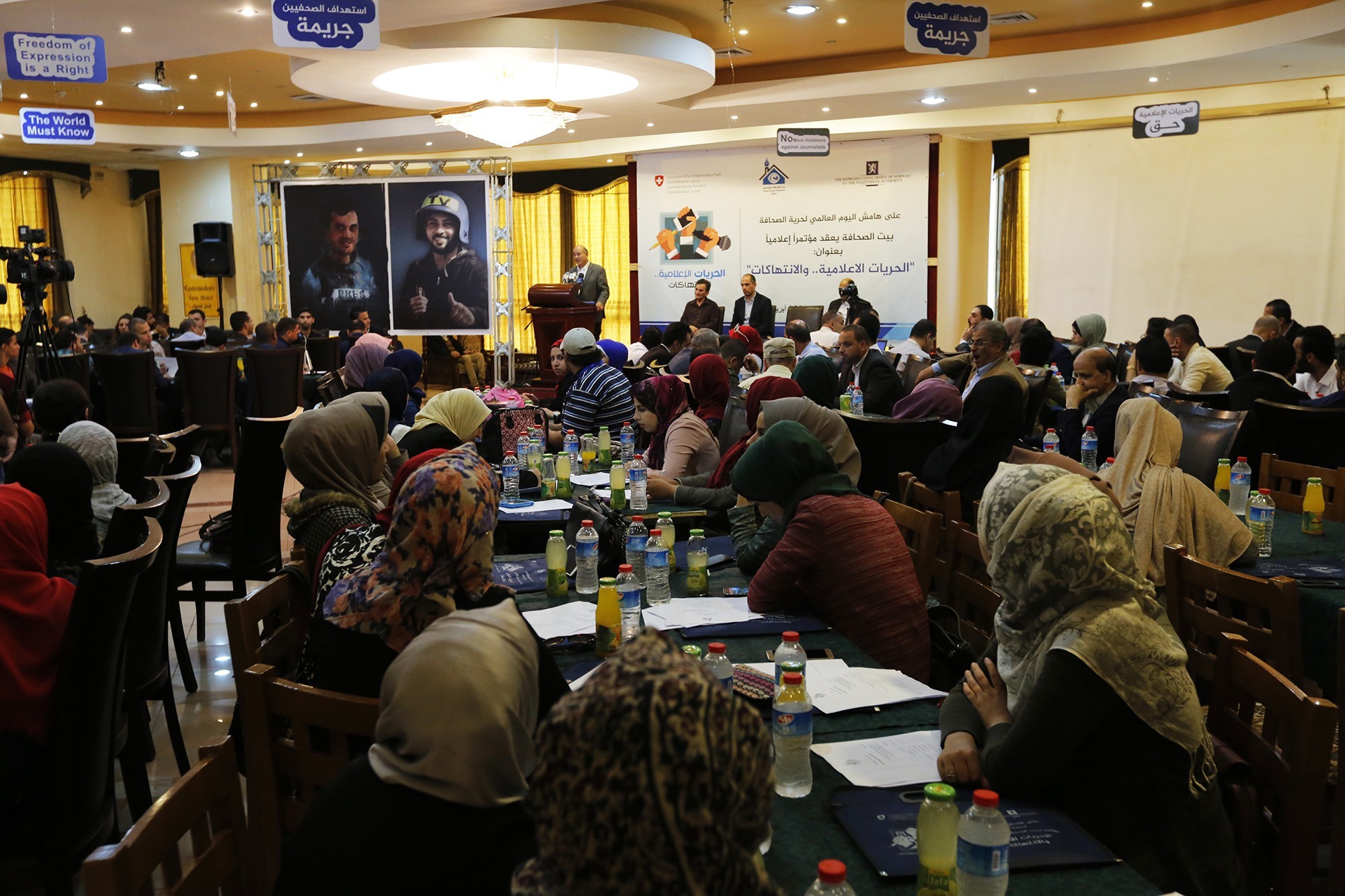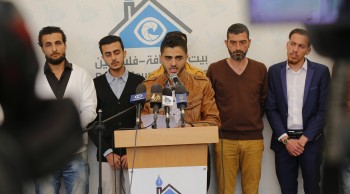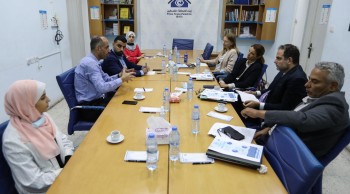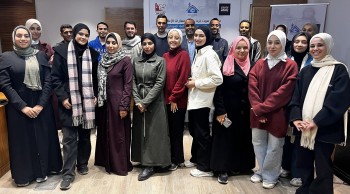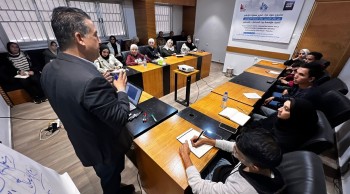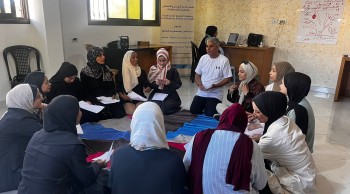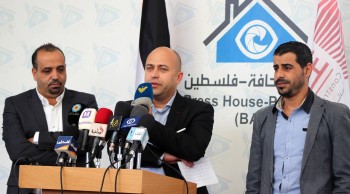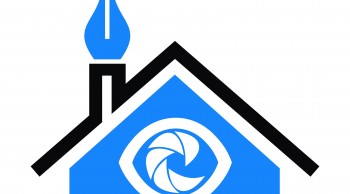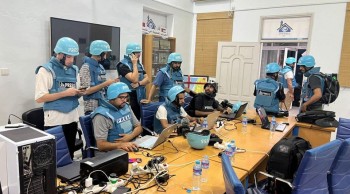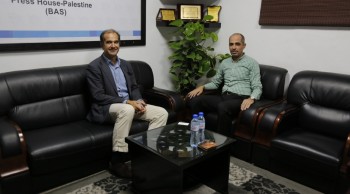Press House- Palestine held its annual conference about “Media freedoms and violations” in Gaza on Sunday, on the sideline of World Press Freedom Day, which will be in May 3rd.
The conference was attended by dozens of journalists and media students, media lecturers in the Palestinian universities as well as the Journalists Syndicate and the Governmental Information Office in Gaza strip.
In his speech at the beginning of the conference, the Chairman of the Press House Belal Jadallah welcomed the audience, stressing that this conference is an extension of the Press House annual conferences for media freedom.
Where, Jadallah stressed the importance of the “World Press Freedom Day” occasion to inform the public about the violations against the right to freedom of expression, as well as the occasion to remind about many courageous journalists who have faced death or imprisonment for their work to show the truth.
He said "When we talk about this occasion in Palestine, it differs from anywhere else in the world," explaining that it comes up in light of the continued violations of the Israeli occupation against freedom of the press and journalists by its deliberate killing of the truth makers without censorship or accountability.
Moreover, He mentioned the martyrs of the truth Yasser Murtaja and Ahmad Abu Hussein, who were targeted by the snipers of Israeli troops at east of Gaza Strip a short time ago, despite wearing the press insignias, stressing the Israeli military weakness in front of the truth that they fear “which reflects its ugliness”.
The chairman of the press house called for strengthening the press corps and the media unit in order to confront the violations against media freedom and stop it.
Where, he urged the media to focus on documenting the violations of the occupation against the Palestinian press and publishing it in the international media particularly to expose its crimes and its heinous practices against the international media freedoms.
He also called the international community to pressure the Israeli occupation to stop its violations against Palestinian journalists, in parallel with the legal prosecution of their murderers.
As well as, he called for pressure on the Israeli occupation to allow the entry of occupational safety equipments to Gaza strip, appealing to the international institutions to work hardly in order to provide the necessary support for that.
Moreover, He reviewed the titles of the working papers to be discussed by experts and participants during the conference, which will bring out some recommendations that we hope to press for implementation and build on them; where it will have an impact on the enhancement of media freedom.
For his part, lawyer Raji Sourani, the director of the Palestinian Center for Human Rights, said that “the Israeli occupation is practicing a new version of "apartheid" to undermine the possibility of establishing a Palestinian state in the future”
Mr. Sourani said in his speech during the conference that the Palestinian people are facing the occupation with a wonderful and simple work through peaceful demonstrations under the propaganda of misleading Israeli media, which tries to show the Gazian citizen in a negative and criminal way.
Where, he pointed to the importance of the responsibility for the Palestinian journalist to face this propaganda; by showing the alternative and real story, and added: "That’s why the Israeli occupation targeted journalists Murtaja and Abu Hussein”.
As well as, he pointed out that this year witnessed an unprecedented targeting of Palestinian journalists in order to kill the anti-novel, calling for the prosecution of those who committed war crimes against their humanity.
The conference included a video clip about the Israeli violations against Palestinian press in Gaza Strip during the last war in the summer of 2014 and the great peaceful return marches as well.
The first session in the conference:
Lawyer Baker Turkmani, Coordinator of the Investigations and Complaints Unit in the Independent Commission for Human Rights, reviewed in a working paper during the first session that presented by lawyer Fatima Ashour entitled “Violations against the Palestinian press from a legal reality”.
He referred to some provisions of the ‘Universal Declaration’ of Human Rights concerning the right to freedom of expression, as well as a number of regional conventions and accords in addition to the Palestinian Basic Law, and the publication law No. 9 of 1995.
Mr. Turkmani also spoke about some "legitimate" restrictions and exceptions to freedom of opinion and expression, citing some examples of a number of "restrictions" aimed at protecting the rights and reputation of others, national security, public order or health and public morals.
Where, he recommended to work in order to promote media freedoms in accordance with international conventions and the Basic Law, stressing the importance of rehabilitating the journalism occupational corps represented by the journalists in general in accordance with democratic methods.
And he called to unify the laws related to media work in order to ensure a unified media legal approach.
Where, he stressed the necessity to empower media professionals and the media means with legal aspects in terms of knowledge and mechanisms to claim rights, stressing that the media and law have an integral relationship.
Moreover, he mentioned to the importance of enhancing the commitment of journalists and the media to the ethics of journalistic work, as well as enhancing the involvement of the media and civil society institutions in the drafting of information laws, calling for the speedy adoption to impose a law for the right to obtain the information.
At her part, Nour Awdeh via Skype from west bank, she said that the separation and divisions between Gaza and west bank are the most serious attacks on freedoms and came up through the second working paper during the conference which talks about “The impact of occupation and division on media freedoms”.
According to Awdeh, the number of internal violations against journalists has increased in the past two years.
She stressed the needs to end the division in the media arena and to strengthen the status of the Journalists Syndicate and improve its performance so that it can carry out its duties more effectively and be the protector and collector of all journalists.
And she recommended to develop the mechanisms of complaints and disciplinary or deterrent measures in the Journalists Syndicate to ensure that any failure or professional transgression is dealt inside the journalists' house.
Where, she called for raising awareness about the role of the journalist in accountability, investigation and providing the legal protection which is necessary for journalists to do their work to the fullest.
Eventually, she pointed out to the importance of strengthening solidarity and cooperation among syndicates especially journalists and lawyers, as well as the human rights organizations to deal with cross-cutting issues in the field of freedoms, since freedoms are indivisible.
The second session in the conference:
In the second session of the conference, which was moderated by Ruba Khalid, the journalist at the Palestinian News Agency (Wafa) Sami Abu Salem reviewed a working paper about "Occupational Safety, Facts and Challenges" pointing out that the Israeli violations haven’t stopped against institutions and media since its inception, because they are the tool that reveals the falsity of its being.
Moreover, he talked about the most prominent threats to Palestinian journalists from various sources and reasons, citing examples such as "Yasser Murtaja, Fadl Shana, Ali Abu Afash .." who were deliberately killed by the occupation.
Abu Salem recommended to enhance the principles of occupational safety through updated various theoretical and practical training, inside and outside the country to avoid the risk and to evacuate at time of danger.
Where, he stressed the importance of legal awareness for the journalists, calling to launch an awareness campaign in various ways about the importance of the press attention to its safety and methods of protection and evacuation with the participation of the Press syndicate, the Ministry of Labor, Municipalities, Crescent and the Red Cross, managers and owners of institutions.
As well as, he urged the concerned institutions to carry out campaigns "in accordance with the law" to ascertain the readiness of the institutions and individuals for the journalists safety and to impose sanctions on violators.
Moreover, he pointed out the importance of working with the recommendation of the Syndicate of Journalists to amend the terms of license (or renewal of license) of media organizations only after the availability of protection tools for press and support crews.
And, he called for holding training courses for the journalists about the skills and importance of documenting what they are exposed to, and arranging meetings with the security and police forces to avoid joint clashes between the parties.
He also recommended to contact the international institutions to intervene and pressure the Israeli occupation to allow access to protective equipments such as a protective shield, helmet and others.
For his part, the social media trainer and consultant Khaled Safi, he talked about working paper which is entitled “the role of social media in documenting violations”
He reviewed some of the violations of the Israeli occupation against human rights and international humanitarian law, which documented through social media networks, highlighting the importance of the role of social media in exposing them.
Where, he talked about the most prominent campaigns focused on exposing the crimes Israeli occupation through social media networks, and some abuses, that came up before providing a number of tips, guidelines and recommendations.
The consultant in the social media recommended contacting the official bodies those in charge of the platforms of the websites in order to conclude protection deals for the Palestinian content from Israeli transgression and deletion.
Moreover, he pointed out the importance of a typical content industry, "fit for a global discourse" on the media sites, mentioning the need to work on opening bridges of cooperation with supporters of the Palestinian case around the world and providing them with news, information, events, crimes and Israeli violations on a permanent basis.
He also recommended building an information platform to archive the media content that activists document on their accounts and pages to serve as an approved media reference.
Recommendations of the Conference:
In conclusion, the conference came out with several recommendations as follows:
1- Working to enhance media freedoms in accordance with international conventions and the basic law.
2- Rehabilitation of the structure of press body represented by the journalist in accordance with democratic methods.
3- Unify laws related to media work to ensure a unified media legal approach.
4- Empowering media professionals and the media legal aspects in terms of knowledge and mechanisms to claim rights.
5- Enhancing the commitment of journalists and the media to the ethics of journalistic work.
6- Enhancing the involvement of media and civil society institutions in the drafting of media laws.
7- Accelerating the adoption of the right to obtain information law.
8- Enhancing the principles of occupational safety through various theoretical and practical training, inside and outside the country, including first-aid skills, risk avoidance and evacuation at risk. However, these courses are not limited to a certain extent.
9- Legal awareness of journalists the journalist learns about his or her rights, particularly regarding the safety and protection of journalists, or about legal rights that lead to their knowledge of protecting journalists from arrest at least, such as copyright laws, audio and video recordings, intellectual property, etc.
10- Working on the recommendation of the Palestinian Journalists Syndicate to amend the terms of license (or renewal of license) of media organizations only after the provision of protection tools for press crews and supporting staff (in accordance with applicable laws).
11- An awareness campaign on the importance of press freedom and methods of protection and evacuation, including printed posts, audiovisual materials and photographs, with the participation of the syndicate, the Ministry of Labor, municipalities, owners and managers of institutions, the Red Crescent and the Red Cross.
12- Campaigns (according to law) of the concerned institutions about the readiness of institutions and individuals regarding the safety of journalists and the imposition of penalties on violators (according to the law).
13- Preparing and holding training courses for journalists about the skills of documentation.
14- Meetings with the security and police forces. Due many of the clashes occurred between journalists on the one side and law enforcement forces on the other side because there are mistakes committed by members of security and police or by the journalists themselves. Literary and professional understandings are needed.
15- Contacting the international institutions to intervene and pressure the Israeli occupation to allow access the protective equipments such as protective shield, helmet and others.
16- Communicate with the official bodies those in charge of the platforms of social networking sites for the purpose of concluding transactions to protect the Palestinian content from Israeli transformation and deletion.
17- Training twitter users and activists about ways to document the Israeli violations and to identify legal methods to condemn the occupation state.
18- Opening bridges of cooperation with supporters of the Palestinian case around the world and providing them with Israeli news, information, events, crimes and violations on a permanent basis.
19- Creating strong channels of communication with official Arab and Western media outlets and providing them with Israeli violations through the social networking sites.
20- Creating a typical content that fits a global discourse on social media networks.
21- Building a media platform that will inform all the media contents documented by the activists on their accounts and pages as an approved media reference.
22- Ending the division in the media arena and strengthen the status of the Journalists Syndicate to improve its performance so that it can carry out its duties more effectively and be the protector and collector of all journalists.
23- Develop complaint mechanisms and disciplinary or deterrent steps in the Journalists Syndicate to ensure that any negligence or professional transgression is dealt with within the journalists’ house.
24- Ddeveloping the legal environment to serve the media freedoms and comply with the obligations of Palestine by acceding to international conventions and agreements related to freedoms and human rights, starting with a campaign of pressure and advocacy to adopt the right to information law.
25- Raising awareness about the role of the journalist in accountability and investigation and providing the necessary legal protection for journalists to carry out their work to the fullest.
26- Enhancing the solidarity and cooperation among between unions, especially the Syndicate of Journalists, Lawyers and Human Rights Organizations, to address cross-dimensional issues in the field of freedoms, considering that freedoms are indivisible.
This conference comes up within the press House events and the project of "Enhancing Freedom Of Expression, the Quality & Independency Of Palestinian Media" which donated by the Governments of Norway and Switzerland.
